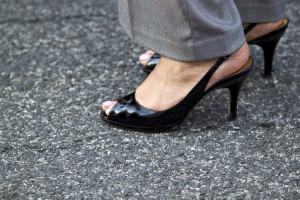More than 40 years ago, girls in high school wore bloomers and played half-court basketball. Married women could not have credit cards in their own name. Women who got into Duke University had to have higher SAT scores than men, and women could not get into UNC-CH as freshmen. There was no Roe v. Wade. There were no home pregnancy tests.
More than 40 years ago, I sat in dorm room with eight or nine other Duke coeds – just talking, woman to woman. Sharing things we had never talked about with anyone else before. It was the era of consciousness raising (CR) groups. And it was life changing for many of us.
At our first meeting, the organizer said that women spend so much time with our husbands and boyfriends — or competing with each other for husbands and boyfriends — that we never really talk together. Our weekly CR meeting was going to change that: we would not be in competition, but would talk frankly and confidentially about what was happening in our lives, working to see the connections and understand what was really going on.
We had a list of questions that was circulating for new CR groups. One, for example, was: “when you think about having children, do you want to have a boy or a girl?” In many groups, including mine, this led to women talking about giving babies up for adoption and about abortions — legal and illegal. The important thing was that we were talking. Just as important was the fact that the women who’d had babies and abortions realized they were not alone.
I started wondering: why wasn’t there good birth control? Why did you have to pretend to be married in order to get it? Why was safe abortion only available to women who had enough money to leave the country or who knew the right people? Why were girls who got pregnant outside of marriage sent away? And why couldn’t unmarried women decide to keep their babies without becoming social outcasts?
We talked about our relationships. About our parents’ expectations and our hopes. About housework. About getting harassed on the street or in our jobs or by professors. About what we thought about our bodies and our periods. About our mothers and their lives.
And one night we talked about rape. The first rape crisis center in the country had just opened in Washington, D.C. Imagine a world without rape crisis centers. It was revolutionary to think that it was not a woman’s fault if she was raped. We talked how debilitating the fear of rape was. One brave woman told her story of going out with a “nice” man who violently forced himself on her. The group fell silent. The concept of “date rape” was mind-boggling to all of us. Then another woman started crying. “Now I understand what happened to me,” she said. “It happened to me too.”
We had been isolated and believed that our experiences were unique to us. CR groups, and later “speak outs,” helped us see we were not alone and that together we could begin to change things. For some of us, that meant changing ourselves or our relationships. One woman went to California and came back to open up one of the first legal abortion centers in the state. One or two others realized they were lesbians and joined the burgeoning lesbian community. A couple of us started tackling on rape culture.
And here we are more than 40 years later. Women can have credit cards. Title IX changed the world for women athletes and students. Rape crisis and domestic violence programs are funded by the state. Abortion is legal and we have emergency contraception available over the counter.
But we are so far from done and every gain is still under attack. Just remember — it’s NOT just you — or, as we used to say, the personal is political.
>> Janet Colm is the founder and former CEO of Planned Parenthood of Central North Carolina. She was arrested as part of the Moral Monday protests in July 2013 and lives in Chatham County, NC.
Janet Colm is the founder and former CEO of Planned Parenthood of Central North Carolina. She was arrested as part of the Moral Monday protests in July 2013 and lives in Chatham County, NC.

I still have my red T-shirt with the women’s power symbol (the traditional female symbol with a fist in the middle of the circle) under a CR in big letters. It was transformative to discuss these questions with other women, to learn that most of most of us were “male-identified” and many of us had given up having other women as friends as we competed for the attention of men. It turned me into a reproductive rights activist, too, as I saw too many young women getting pregnant for lack of information and services, while the men they were pleasing took no responsibility. I’m dismayed that we’re still fighting some of these battles 40 years later, but we must!